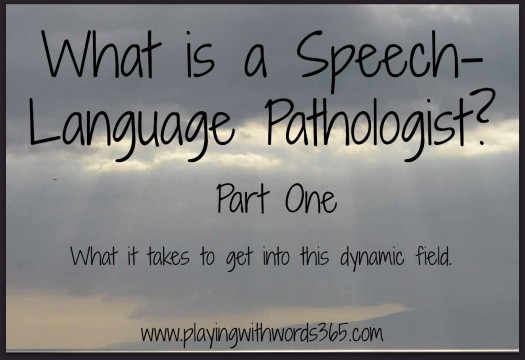I was trying to figure out what I should blog about first, and I thought perhaps a great place to start, would be to explain exactly what it is I *am* (well, other than a wife and a mama). To read my long story about how I got to be an SLP, click HERE. Now, what exactly IS a speech-language pathologist?


Well, the simple answer is that a speech-language pathologist, or SLP, is a professional who is trained to treat and remediate communication disorders in people of all ages. It sounds simple enough, right?
Well, let me tell you, it is definitely not a simple occupation. First of all, let’s start with the education that is required to be an SLP.  If you read my ABOUT me section, you will already know that when I started the program in college as a junior, I didn’t realize that I was going to need to continue on to graduate school because you need a Masters degree to practice as an SLP (perhaps I should have read the catalog a bit more closely?) I had already completed FOUR years of college by the time I started the program (yes, I was on the six year plan…) so it was hard for me to not just give up when I found this out the first week of school that Fall.
But, I ended up falling in love with my classes and yes, going to college for EIGHT years straight. Wait…..shouldn’t I be a Doctor??
Anyway, back to the education. So you need a Bachelors degree (I did mine in Speech Pathology and Audiology) and then you need to get your Masters degree in something along the lines of Communication Sciences and Disorders (that was mine). Sometimes they are Bachelors and Masters in Arts (like mine) and sometimes they are in science…just depends on the institution.

The curriculum includes subjects like anatomy and physiology in speech and swallowing (oh, did you know we are also trained in swallowing disorders?), speech, language, and hearing development across the life span,  phonetics, acoustics, neuroanatomy and physiology of speech, language and swallowing (you read that correctly…I took three graduate level neurology classes), speech disorders across the life span, aural rehabilitation, research methods, audiology, auditory processing, assessment and management of fluency, disorders in voice and resonance, diagnostic methods, professional issues in speech pathology, disorders and management of articulation and phonology…I even took American Sign Language classes! In addition to all this coursework, we also had to keep a portfolio of papers/work/projects across all the different areas of speech/language/hearing/swallowing development and rehabilitation.

As an undergrad you need to do many hours of observations of SLPs in both the school and medical settings (I think it was 25 hours when I graduated). Then as a graduate student you work in your college clinic doing both assessments and treatments under the supervision of your professors (for credits) and then you do two different internships: one in the school setting and one in a medical setting. You need to sit for the national exam called the Praxis Exam in Speech Language Pathology, which is basically like a SLP board exam. Then to finish it up, you either do a thesis or take the comprehensive exams. Our whole class opted for the exams which were three days in a row and consisted of several essay questions each day. They were brutal. But I passed!

THEN, after all that work…..four years of basically nothing but classes about speech, language and swallowing, observation hours, internships, board exams, comprehensive exams, portfolios… you graduate with your Masters but you are NOT DONE YET! You still have to work for a year as a clinical fellow for one year under the supervision of a licensed, credentialed, and certified SLP. You have to log all your hours, go thru several evaluations, and then turn it ALL IN to three DIFFERENT organizations (don’t forget those checks for the processing fees!) and then, finally, after five years, you can call yourself a licensed (through your state), credentialed (again, through your state, so you can work in the school setting) and certified (through ASHA, the American Speech-Language Hearing Associated…this is kind of like the equivalent of a teacher or other professional getting Board Certified in their profession) SPEECH-LANGUAGE PATHOLOGIST!!!
You get to put the oh-so-fancy letters after your name: CCC-SLP. Which, FYI, stands for Certificate in Clinical Competence in Speech-Language Pathology (the board certification part, through ASHA).
Do you feel exhausted yet? I do! Ha!
Once you complete all this…you now are qualified to work in hospitals, nursing homes, schools, Early Intervention, private practice…whatever your heart desires!

So what did I pick? When I was in graduate school I really fell in love with the rehabilitation setting. I did am internship at our local hospital inpatient rehab department (40 hrs a week for 12 weeks, ON TOP OF SCHOOL) and LOVED IT. I worked with stroke patients and traumatic brain injury mostly and I just loved seeing the fast progress. Yes, I did have a patient die in those 12 weeks and yes it sucked, but overall I loved it. So when I graduated I tried to find a job in rehab. Unfortunately I was swindled by a contract company (more on that another time) and ended up in a job in a skilled nursing home, or a SNF, and HATED IT. I quit after 2 months and headed to work in the schools.
So, that….in a nutshell….is the education needed to be a speech-language pathologist. If you are a fellow SLP reading this, give yourself a pat on the back! It was a long hard road. If you are a parent reading this, I hope this gives you an idea of what it takes to be an SLP. We are not just “speech teachers†(oh how I loathe that title).
Now, what exactly is it what we do? Stay tuned for Part Two of What is a Speech-Language Pathologist.
***************************************************** Photo Credits:
Woman Reading Book by Graur Razvan Ionut. Teacher Desktop by Keerati A Schoolboy And His Teacher by Paul Gooddy Graduation Hat by wishedauan School Books On Desk With Sketchboard by photostock
Thanks for these! I’m a junior in high school, considering going into Communication Disorders, and eventually SLP grad school. 🙂
Sharon, DO IT! You’ll LOVE IT! 🙂
Thank you so much for this! I’m currently a 1st yr. grad. student and have been feeling incredibly overwhelmed by all the information we are supposed to learn/know/understand and apply! I’ve always been a hard worker at everything and have been excessively worrying about whether I will be competent at this or not, is that normal for grad. school?? Also, when exactly do you feel confident about what to do for any situations, where to start, etc.?? ANY ADVICE/INFO WOULD BE GREAT!!!
–
Also I have always been extreeeeemely interested in TBI/rehab since day 1 🙂
I’m 23 and I go to a community college, I’ve changed my major so many times but I think I know what I want to do. This blog really has me interested in SLP, I’ve been thinking about this for the past year or so and I think I might go for it. I was wondering though, is there a doctoral degree for this major?